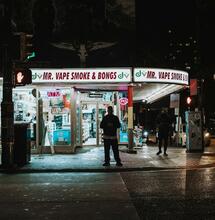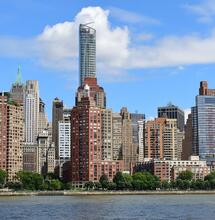New York Cannabis: First Lease Signed in Harlem

It has finally been announced where the first New York cannabis retail location would be. The first lease is near the historic Apollo Theater in Harlem. In October, Gov. Kathy Hochul said that 20 legal cannabis shops would operate in New York by the end of 2022, but as the year is nearing an end, that number is highly unlikely.
New York state authorities hope to see the leasing of more cannabis dispensaries by the year's end as they announce the first of 150 locations.
Last week, the Dormitory Authority of the State of New York (DASNY) signed its first lease for a property situated at 248 W. 125th. "For those of you familiar with Harlem, you can stand at the Apollo and throw a baseball right across the street," said the Dormitory's president and CEO, Reuben R. McDaniel III.
McDaniel said the preliminary plans for the 2,800-square-foot location are almost done, and that construction would start soon after the Dormitory approves a final plan. It was not immediately revealed who would be responsible to run the location.
The first lease announcement comes at a time when there are significant doubts if New York will manage to open its first legal cannabis dispensaries by the end of 2022.
The first permits issued by the Office of Cannabis Management are known as Conditional Adult-Use Retail Dispensary (CAURD) licenses. They are rewarded to those who have been persecuted or whose families have been affected during the War on Drugs. A batch of eight licenses has also been reserved for non-profit organizations that work with people with past marijuana-related arrests and convictions.
New York authorities announced the first 36 licenses at the end of November. The CAURD recipients will become the first legal retailers of weed in New York. As the licensees prepare to enter the legal market, they are to face fierce competition from illegal street vendors who have become increasingly visible across New York City.
Under New York regulations, individual CAURD licenses are paired with a ready-to-go retail location. In addition, recipients also have access to loans, a rare perk as cannabis businesses are still largely unable to access regular financial services.
All measures are part of a greater effort to ensure that New Yorkers who have been victims of previous marijuana laws can enter business with a competitive advantage before the market becomes oversaturated with big brands.
New York has used a $200 million Social Equity Cannabis Investment Fund to pay for the set up of the legal dispensaries and help with the loans.
The Dormitory trusted the fund's management to Social Equity Impact Ventures LLC, a private venture team that includes NBA star Chris Webber among others. The team has been tasked to raise $150 million of the total sum from private investors.
It's a daring plan, but New York has dealt with complex monetary transactions and management many times before.












